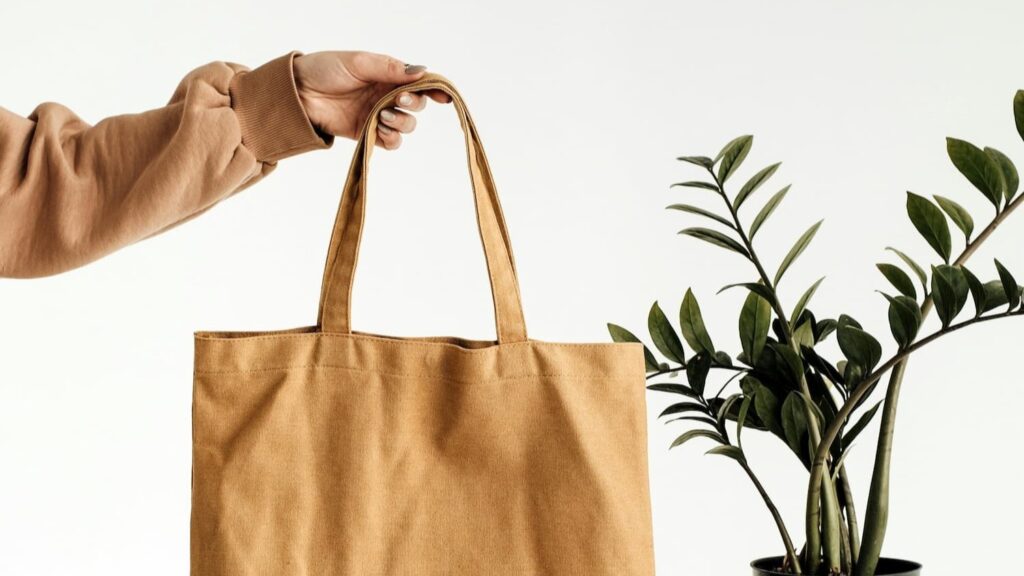
What is Eco Friendly Living?
Eco-friendly living is all about adopting lifestyle habits that prioritize reducing waste, conserving the planet’s resources and protecting biodiversity.
Living a sustainable lifestyle as a student can sometimes feel challenging but I promise you that it doesn’t have to be like that!
I’ll share simple sustainable living tips with you that help making environmentally friendly choices and reducing your carbon footprint easy.
It’s all about adopting small eco-conscious habits that are manageable.
Why Eco Friendly Living Still Matters
Yes, I know… A lot of us feel exhausted constantly hearing about climate change and eco-friendly living. Me too sometimes!
Making sustainable lifestyle changes can often feel overwhelming and confusing because there is a lot of misinformation and greenwashing companies out there.
How are we even supposed to make the right choices?
Sustainable living can also sometimes be more expensive and inconvenient. Especially, when you are a stressed student on a budget!
And some of us can also feel hopeless and think that individual actions don’t matter.
But as a biology student, who has met many experts at university, I can assure you that eco-friendly living still matters! Not just for the environment, but for yourself too!
In fact, every 0,1°C increase makes a HUGE difference!
And not to forget: Eco-friendly lifestyle changes often come with a healthier, more balanced life and can often even save you money!
So, here are 38 Eco Friendly Living Ideas for Students (And don’t worry! You don’t have to do it all.):
Minimalism + Eco Friendly Living
1. Buy less
No matter how many eco-friendly products you buy, buying less is always better. Not just for the environment, but for your purse too.
Keep in mind that every product you buy uses human and planetary resources.
So, next time you think about buying a product, think twice and reflect on if you actually need that item.
2. Borrow and share
Textbooks, formal wear or special cooking appliances… There are just some things that we only need once or a few times a year.
Consider borrowing from and sharing with others. Especially if you live in a dorm room with other students, sharing cooking appliances and cleaning supplies can be a great option.
3. Reduce, reuse, recycle
Don’t throw this sweater away already just because it has a hole.
Maybe you can find a way to repair it or sew a cute pillowcase.
Spark your creativity, create something new and reduce your environmental impact all at the same time!
4. Reflect on your shopping habits regularly
If you want to live an eco-friendly lifestyle, being aware of unnecessary purchases and their environmental impact is key.
Try to question whether you really need a product or if you can buy it secondhand or from a sustainable brand instead.
This small habit contributes to a more sustainable lifestyle AND saves you money.
Eco Friendly Living on Campus
5. Reusable cups and bottles
Avoid single-use bottles and coffee cups and invest in reusables instead.
Cutting down on plastic waste is a simple but powerful action step you can take to promote sustainability.
And AGAIN using reusables saves you a lot of money over time!
6. Take digital notes instead of using paper
What if you could be more environmentally friendly, make organizing simpler and cut down on the need to constantly buy new notebooks and paper all at once?
I strongly suggest you to go digital with all your university notes to reduce paper waste and paper clutter.
7. Use public transport or a bike
If you can, use public transport or bike to uni.
This helps you reduce your carbon footprint and lower air pollution while making you live a more active lifestyle.
Many cities offer student discounts on public transport tickets! So, do your research and maybe even save money on the way!
8. Borrow books from the library
A lot of the time, we only read a book once. So why waste paper, money and space?
Get a library card and keep book purchases at a limit to live a more sustainable lifestyle.
Eco Green Living at Home
9. Save electricity
To live a more eco-friendly lifestyle, unplug electronics when they are not in use to save energy.
Over time, standby energy consumption can add up to significant amounts of wasted energy that can easily be avoided.
10. Avoid using an air conditioner
Did you know that air conditioners and fridges alone are responsible for 7% of global greenhouse gas emissions? (United Nations Environment Program, UNEP)
If you can, avoid using them and instead, open the windows at night, use fans and block out the heat of the sun by closing your curtains and blinds.
11. Reduce streaming
Although streaming doesn’t have a relatively big impact on the environment, it still takes some energy.
Prioritize offline activities like reading or playing board games instead.
12. Delete old emails and files
Declutter your digital devices to free up digital storage energy.
Regularly deleting old files keeps you organized and makes your lifestyle more sustainable.
13. Minimalist decor
Instead of buying new decor every year and season, try finding timeless pieces and keeping your purchases minimal.
You can also make decor yourself by using nature materials or things you already have at home. You will find plenty of DIY decor ideas on Pinterest.
14. Second hand furniture
We all know that buying second hand instead of new is always more environmentally friendly. This is also true for furniture.
Explore thrift stores near you and maybe you discover some hidden vintage treasures.
Eco Friendly Bathroom Tips

15. Bamboo toothbrushes
Using bamboo toothbrushes is a great way to reduce your plastic waste. Plastic toothbrushes are mostly not recyclable and, unfortunately, end up in landfill.
16. Reusable razors
The same thing happens with single-use plastic razors. Switch to a reusable razor out of stainless steel or aluminium and save money by only repurchasing the blades.
17. Eco-friendly period products
Menstrual cups, period underwear, biodegradable pads, organic cotton tampons… There are tons of eco-friendly period products you can use instead of traditional pads and tampons.
Try them out and see what works best for you!
18. Organic personal care products
Conventional shampoos, soaps, toothpaste, skincare products, deodorants etc. often contain toxic ingredients that pollute the environment and harm ecosystems.
Switching to organic brands is not only more eco-friendly but also safer for your health.
19. Save water
Saving fresh water makes a big difference in protecting our planets resources. Reduce unnecessary water use to live a more sustainable lifestyle.
Sustainable Living Food Habits
20. Reusable lunch boxes
Choose reusable lunch boxes made from stainless steel, glass or BPA-free plastic instead of plastic wraps.
This way, you can reduce single-use plastic waste, save money over time and avoid chemicals that harm your health.
21. Avoid palm oil products
Check the ingredient lists of your food, personal care products and cleaning products for palm oil.
Palm oil does not only fuel climate change but also negatively affects biodiversity because of the deforestation that happens in the production process.
Find other products without palm oil and you won’t even have to think about it anymore.
22. Plant-based diet
According to this article of The Guardian, a vegan diet does not only help reduce emissions and water use, but also protects wildlife significantly.
But even if you only decide to eat less animal products than usual, it’s a step in the direction of a more eco-friendly lifestyle.
23. Seasonal and local food
Another tip for living a more sustainable lifestyle is buying locally grown seasonal food.
This lowers carbon emissions from transportation and saves water and energy.
24. Organic food
Organic food is grown without pesticides, herbicides or artificial fertilizers, which all harm soil health, water quality and biodiversity.
So, if you can, spend those extra bucks to protect the planet AND your health.
25. Drink tap water
Buying water or other drinks in plastic bottles is not only expensive but also pollutes the environment.
If you live in a region where drinking tap water is safe for your health, go for it!
26. Avoid food waste
Reducing food waste is a great opportunity to not only live more sustainably but to save money too.
Make shopping lists, buy only what you really need and be creative with leftovers.
27. Go zero-waste
When shopping, try to avoid unnecessary packaging to reduce waste. Choose glass over plastic and buy in bulk.
28. Support vegan Restaurants
Although, I love trying out new food, I don’t go to restaurant very often. But if I do, vegan restaurants are my way to go!
It’s a great way to show your peers that vegan food is more than just vegetables too!
Sustainable Shopping and Clothes

29. Borrow clothes for special occasions
Just last year I borrowed a ball gown from a friend of mine.
It was a great opportunity to save money, avoid a cluttered closet and live a more eco-friendly lifestyle.
30. Shop clothes second hand
Thrifting clothes is a great way to lower your environmental impact. Second hand clothes are also often more unique, cheaper and don’t contribute to unethical working conditions and child labor.
31. Reusable shopping bags
There are plenty of beautiful reusable tote bags out there. Invest in one to prevent polluting the planet with plastic.
Or sew one yourself! I did that years ago and have never looked back to single-use shopping bags!
Eco Friendly Travelling Tips
32. Travel by train
As an individual, the most effective thing you can do to reduce your environmental impact is to travel by train instead of car or plane.
I actually love travelling by train because I can just relax, look out of the window or read a good book.
33. Avoid chemical sunscreen
I totally get it when you prefer to use chemical sunscreen in your everyday life.
But if you’re on a vacation where you swim in the sea or lake, switch to physical sunscreen to avoid harming marine life with toxic chemicals.
Activism for Environmentally Friendly Living
34. Advocate for sustainability
Show your friends, family and colleagues that sustainable living doesn’t have to be hard.
Share what you know about sustainability without judgement and encourage others to live a more eco-friendly life.
You can also organize clothing swaps or suggest going to vegan restaurants to make an impact.
35. Support ethical and local business
Ethical businesses are often more sustainable and transparent and prioritize fair labor conditions.
If they are local as well, they have a smaller carbon footprint than big corporations because products are usually produced closer to your home.
Ethical and local businesses also usually set more value on quality and uniqueness.
36. Eco friendly gifts
Holidays and birthdays are the perfect time to make your loved ones happy with unique and personal gifts.
But instead of harming the environment by buying mass-produced gifts from non-sustainable materials, opt for DIY gifts, experience-based gifts or gifts from sustainable and ethical brands.
Underrated Sustainable Living Tips
37. Protect insects
I never hear anyone talking about this, but if you see a spider or insect in your dorm room, please don’t kill it!
Grab a jar or some other container and bring it outside.
I know that spiders can be scary. But if you live in a country where spiders and insects usually aren’t dangerous, spare them and protect the biodiversity of our planet.
I promise that it gets easier and less scary over time!
38. Sustainable contraception
Did you know that hormonal birth control can cause harm in plants and aquatic animals?
Unfortunately, hormones can be released into the water through peeing and contaminate it. (Women’s Health Group Chicago)
I’m obviously not advising you to get off the pill if that’s the only available contraception method to you that you feel safe with.
But if you’re open to alternative methods of birth control, there are more sustainable options like copper IUDs or condoms made from biodegradable materials.
Do your research and see what works best for you!
How can Students Make Sustainability a Long-Term Lifestyle
Switching to a more eco-friendly lifestyle usually doesn’t happen overnight. Even I am not always perfectly sustainable.
But that’s totally okay! Eco-friendly living is an ongoing process. The goal is to reflect on your actions and habits regularly.
Instead of trying to do it all and ultimately wanting to give up, make sustainable living work for YOU by taking simple but manageable steps.
And yes, climate change and loss of biodiversity is happening. And it’s happening fast!
But if you’re trying your best that is all you can do. Don’t let that discourage you and I promise that you will make a difference!
Final Thoughts
So… those were a lot of eco-friendly living tips for students!
I’m so glad that we’re all on this journey to a more mindful and sustainable life together.
And I’m so proud of you for sticking around and trying your best for our planet and you.
If you want, share in the comments what you find most challenging about eco-friendly living as a student!
See you in my next blogpost!

1 thought on “38 Eco Friendly Living Tips for Students: The Ultimate Guide”
Comments are closed.